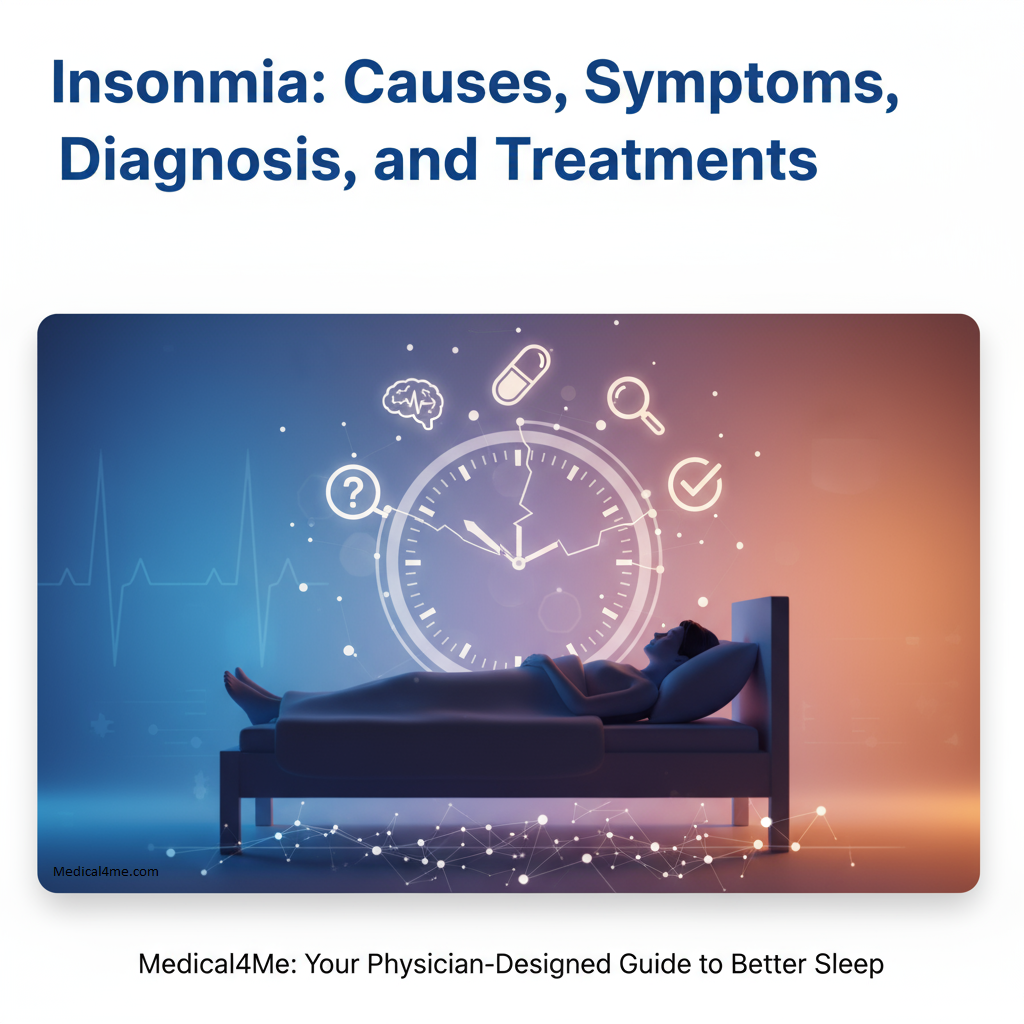Insomnia Treatment: A Doctor’s Comprehensive Guide to Reclaiming Your Sleep

Are you staring at the ceiling at 3 AM again, mind racing while the world sleeps? You’re not alone in this. The truth is, up to 1 in 3 adults experience at least mild insomnia. I understand this can be scary, frustrating, and deeply isolating. Many people feel overwhelmed by the exhaustion and its impact on their daily lives. But persistent sleep problems aren’t a life sentence. This guide offers a physician’s perspective on effective insomnia treatment, from understanding its core nature to exploring evidence-based therapies that can help you finally get the restorative sleep you deserve. We’ll explore causes, symptoms, and real solutions.
What Exactly Is Insomnia? More Than Just a Bad Night
Look, everyone has a rough night of sleep now and then. That’s not insomnia. We’re talking about a genuine sleep disorder characterized by a persistent difficulty with sleep initiation, duration, consolidation, or quality. And this occurs despite having adequate opportunity for sleep. But it’s the “daytime impairment” that really defines it clinically. If your trouble sleeping is making you fatigued, irritable, or unable to concentrate at work or home, then we’re in the territory of a medical condition needing attention.
Medical Definition: Insomnia
Insomnia is a common sleep disorder characterized by difficulty falling asleep, staying asleep, or achieving high-quality, restorative sleep. It is considered chronic if it occurs at least three nights per week for three months or longer. The condition leads to significant distress or impairment in social, occupational, or other important areas of functioning. It’s not just about feeling tired; it’s about your overall health care and quality of life.
Here’s a simple analogy: Think of your brain’s sleep-wake cycle as a light switch. In a healthy sleeper, that switch flips to “off” at night and “on” in the morning. For someone with insomnia, that switch is faulty. It might be stuck, flicker on and off all night, or flip on way too early. The goal of any good insomnia treatment isn’t just to force the switch off with a drug; it’s to repair the underlying wiring so the switch works naturally again.
Recognizing the Symptoms and Signs of Insomnia
The indicators of insomnia go far beyond simply being awake at night. They cascade into your waking hours, affecting everything from your mood to your physical health. Honestly, it’s this daytime struggle that often brings patients into my office. Let me explain the progression of signs you might experience, from mild annoyances to severe, life-altering problems. Recognizing these is the first step toward seeking the right help for your sleep disorder.
Here’s a breakdown of what these signs can look like:
- 🟢 Mild Indicators: You may find it takes longer than 30 minutes to fall asleep a couple of nights a week. Or perhaps you wake up once or twice during the night but can fall back asleep. The next day, you might feel a little groggy, but a cup of coffee usually gets you through. This is annoying, but not yet debilitating.
- 🟡 Moderate Indicators: Now, the trouble sleeping is happening most nights. You lie awake for an hour or more, or you wake up multiple times and stay awake for long periods. Daytime fatigue is constant. You may notice increased irritability, difficulty concentrating, and making more mistakes at work. You’re living in a persistent brain fog.
- 🔴 Severe Indicators: Sleep is fragmented and unrefreshing almost every single night. The chronic sleeplessness is causing significant emotional distress, including symptoms of anxiety or depression. You may worry constantly about sleep, leading to a vicious cycle. Your work performance, relationships, and physical health are noticeably suffering. This level of sleep deprivation is a serious health risk.

Understanding the Causes and Risk Factors
So, why is this happening? Insomnia isn’t a one-size-fits-all condition. It’s often a complex puzzle with multiple contributing pieces. In my clinical experience, it’s rarely just one thing. It’s usually a combination of predisposing factors (like a tendency to worry), precipitating factors (a stressful life event), and perpetuating factors (bad habits developed to cope with sleeplessness). The National Institutes of Health (NIH) notes that stress is one of the most common triggers for short-term insomnia.
Let’s break down the most common culprits behind persistent sleep problems:
- Psychological Stress and Anxiety: This is the big one. An overactive mind, worry about work, family, or health can keep your nervous system in a state of high alert, which is the polar opposite of the relaxed state needed for sleep.
- Poor Sleep Habits (Sleep Hygiene): Irregular sleep schedules, stimulating activities before bed (hello, smartphone!), an uncomfortable sleep environment, and consuming caffeine or alcohol too close to bedtime can all disrupt your natural sleep rhythm.
- Medical Conditions: A huge range of issues can cause insomnia. Chronic pain, breathing problems like sleep apnea, restless legs syndrome, acid reflux, and hormonal shifts (like menopause) are frequent offenders.
- Medications: Certain prescription drugs can interfere with sleep, including some antidepressants, blood pressure medications, corticosteroids, and stimulants used for ADHD. Even some over-the-counter medicines can be problematic.
- Lifestyle Factors: Shift work wreaks havoc on the body’s internal clock (circadian rhythm). And lack of physical activity can also contribute to poor sleep quality. You know, it’s a tangled web.
The Diagnostic Journey: How a Doctor Investigates Insomnia
If you’re struggling, the first step is talking to a medical professional. Don’t just assume you have to live with it. A proper diagnosis is crucial because the right insomnia treatment depends entirely on the underlying cause. Your physician will act like a detective, gathering clues to understand your specific situation. Here’s something interesting: the diagnosis is often more about conversation than complex tests.
Here’s a typical step-by-step process:
- Step 1: Medical History & Sleep Discussion (1-2 Weeks): Your doctor will ask detailed questions. When did the trouble sleeping start? What does it feel like? What’s your daily routine? They’ll want to know about your stress levels, diet, medications, and any other health conditions.
- Step 2: The Sleep Diary (2 Weeks): This is your homework. You’ll be asked to keep a detailed log of your sleep patterns for a couple of weeks. You’ll record when you go to bed, when you wake up, how long it took to fall asleep, and how you felt the next day. This provides invaluable objective data.
- Step 3: Physical Exam & Blood Tests (Contemporaneous): A physical exam can help rule out underlying medical issues. Blood tests can check for things like thyroid problems or vitamin deficiencies that might be contributing to your chronic sleeplessness.
- Step 4: Referral for a Sleep Study (If Needed): If a condition like sleep apnea is suspected, your doctor might refer you to a sleep specialist for a polysomnography. This overnight study monitors your brain waves, breathing, and body movements while you sleep.

Treatment Options: A Comparison of Modern Therapies
Once a diagnosis is made, it’s time to talk about management. The good news is that there are highly effective options. The gold standard for chronic insomnia isn’t a pill. It’s a type of therapy. But sometimes, medication has its place. We’ll compare the main approaches to managing sleep disorders so you can have an informed conversation with your healthcare provider.
| Treatment Approach | How It Works | Effectiveness | Potential Side Effects |
|---|---|---|---|
| Cognitive Behavioral Therapy for Insomnia (CBT-I) | A structured program that helps you identify and replace thoughts and behaviors that worsen sleep problems with habits that promote sound sleep. | Highly effective. Studies show 70-80% of people with chronic insomnia experience improvement. Long-lasting results. | Virtually none. May cause temporary sleepiness as your schedule is adjusted. |
| Prescription Sleep Medications (e.g., Z-drugs) | These drugs work on brain receptors to induce sleepiness. They are intended for short-term use. | Effective for short-term relief of acute insomnia. Less effective for long-term chronic insomnia due to tolerance and dependency risks. | Drowsiness, dizziness, impaired next-day function, risk of dependence, and complex sleep behaviors. |
| OTC Supplements (e.g., Melatonin) | Melatonin helps regulate the circadian rhythm. Other supplements like valerian root may have mild sedative effects. | Mixed results. Melatonin is most effective for circadian rhythm issues like jet lag. Evidence for other supplements is often weak. | Generally mild, but can include headaches or dizziness. Quality and dosage are unregulated in many places. |
| Sleep Hygiene & Lifestyle Changes | Creating a routine and environment conducive to sleep (e.g., cool, dark room; no screens before bed; consistent schedule). | A crucial foundation for any treatment, but often insufficient on its own for chronic insomnia. Best when combined with CBT-I. | None. Positive effects on overall health. |
Actionable Prevention Strategies & Sleep Hygiene
Whether you’re recovering from insomnia or want to prevent it, building a fortress of healthy sleep habits is your best defense. This is what we call “sleep hygiene.” It’s about creating a lifestyle and environment that invites sleep in. It might sound basic, but I’ve seen patients who make these changes and see a dramatic improvement. Consistency is the most important part of this equation.
Your Daily Sleep Checklist
Treat your sleep schedule like an important appointment you can’t miss. Here’s an actionable checklist to build a robust sleep routine and improve your chances of getting restorative rest.
- Stick to a Schedule: Go to bed and wake up at the same time every day. Yes, even on weekends. This stabilizes your body’s internal clock.
- Create a Relaxing Bedtime Ritual: An hour before bed, wind down. Read a book, take a warm bath, listen to calm music, or practice meditation. No screens! The blue light messes with melatonin production.
- Optimize Your Bedroom: Your bedroom should be a sanctuary for sleep. Keep it cool, dark, and quiet. Invest in blackout curtains or a white noise machine if needed.
- Watch What You Eat and Drink: Avoid large meals, caffeine, and alcohol in the hours before bed. A light snack is okay, but a big meal can cause discomfort.
- Get Moving During the Day: Regular physical activity can promote better sleep. Just try not to exercise too vigorously close to bedtime. Morning or afternoon workouts are ideal.
These strategies are fundamental to any effective insomnia treatment plan. They empower you to take control of your sleep, turning your bedroom from a battleground into a peaceful retreat. They might not fix severe chronic insomnia alone, but they make every other therapy much more effective.
When to Seek Medical Help for Insomnia
It’s easy to brush off trouble sleeping as “just a phase.” But there are clear times when you absolutely must consult a doctor. Chronic sleep deprivation isn’t a badge of honor; it’s a serious medical issue with real consequences for your physical and mental health. I want you to know the red flags.
Red Flags: See a Physician Immediately
If your sleeplessness is accompanied by any of the following, please don’t wait. Schedule an appointment with your medical professional. These signs could indicate a more serious underlying condition that requires prompt diagnosis and management.
- Your insomnia lasts for more than four weeks and is not improving.
- Sleepiness is severely impacting your job, causing you to make dangerous mistakes, or leading to accidents while driving.
- It is accompanied by shortness of breath, chest pain, or loud, disruptive snoring (a sign of sleep apnea).
- You have severe mood changes, feelings of hopelessness, or depression.
Let me share what typically happens. A patient endures poor sleep for months, even years, before seeking help. They’re often at their breaking point. But once we start a proper diagnostic and treatment process, they are amazed at how much better they can feel. Don’t let it get to that point. Early intervention is always better. A serious risk. Proactive care is the best health care.
A Patient’s Story: Sarah’s Journey Back to Sleep
I’ve seen patients who, like Sarah, a 42-year-old marketing manager, felt their life was unraveling due to insomnia. For months, mounting work pressure had her mind racing at night. She tried over-the-counter aids, but they left her groggy. Her work suffered, and her patience with her family wore thin. She felt trapped in a cycle of exhaustion and anxiety about not sleeping.
When Sarah came to my clinic, we started with a sleep diary and ruled out other medical causes. The culprit was clear: learned, or psychophysiological, insomnia. We began a course of CBT-I. It was tough at first—especially the sleep restriction part. But within three weeks, she started falling asleep faster. After eight weeks, she was sleeping through the night consistently. She learned to challenge her anxious thoughts about sleep and create a wind-down routine that worked. For Sarah, the insomnia treatment wasn’t a magic pill; it was re-learning the natural skill of sleeping.
Latest Research & Developments (2023-2024)
The field of sleep medicine is constantly evolving, which is fantastic news for anyone with persistent sleep problems. Researchers are finding more targeted and accessible ways to provide relief. What I’ve learned is that technology is playing a huge role in making the best treatments more widely available.
For instance, a major 2023 meta-analysis published in the Journal of Clinical Sleep Medicine looked at over 30 randomized controlled trials on Digital Cognitive Behavioral Therapy for Insomnia (dCBT-I). The study, encompassing thousands of patients, confirmed that app-based and online CBT-I programs are highly effective in reducing insomnia severity, with results comparable to traditional face-to-face therapy. According to the American Academy of Sleep Medicine, this is a game-changer, making the gold-standard insomnia treatment accessible to people who lack access to trained therapists. It’s a huge step forward in public health.
Frequently Asked Questions
For many people, yes. While some may have a lifelong predisposition to sleep issues, effective insomnia treatment like Cognitive Behavioral Therapy for Insomnia (CBT-I) and consistent sleep hygiene can lead to long-term remission. The goal is to equip you with tools to manage sleep disruptions, effectively ‘curing’ the chronic condition.
Short-term use of melatonin is generally considered safe for most adults. However, long-term safety data is limited. It’s best used to reset your sleep cycle, like with jet lag, rather than as a nightly sleep aid. Always consult your physician before starting any new supplement, including melatonin, for persistent sleep problems.
This varies. Lifestyle changes can bring improvement in days or weeks. CBT-I typically shows significant results in 4 to 8 weeks. Medications may work immediately but are often not a long-term solution. Patience and consistency are key to successfully managing sleep disorders.
Absolutely. Anxiety and insomnia have a strong bidirectional relationship. Anxious, racing thoughts can make it impossible to fall asleep, and sleep deprivation, in turn, amplifies anxiety. Treating one, like in our article on anxiety management, often helps improve the other. An effective treatment plan must address any underlying anxiety.
Acute insomnia is short-term, lasting from a few days to a few weeks, often triggered by stress or a life event. Chronic insomnia is more persistent, occurring at least three nights a week for three months or longer. Chronic sleeplessness typically requires a more structured treatment approach than acute episodes.
Your Path Forward to Better Sleep
Struggling with sleep can feel like a lonely, uphill battle fought in the dark. But it’s a battle you can win. The most important takeaways are that insomnia is a treatable medical condition, not a personal failing. Understanding the root causes is the first step toward finding the right solution. For most people with chronic insomnia, Cognitive Behavioral Therapy (CBT-I) offers the most effective and lasting relief, far surpassing the long-term benefits of sleeping pills. It’s about retraining your brain, not just sedating it.
Your next step is action. Start by implementing the sleep hygiene tips tonight. Begin a sleep diary to gather data. And most importantly, if you’ve been struggling for more than a month, make an appointment with your doctor. A structured insomnia treatment plan can restore your nights and revitalize your days. You have the power to reclaim your sleep and your health. Don’t wait another sleepless night to start.
This content is for informational purposes only and is not a substitute for professional medical advice, diagnosis, or treatment. Always seek the advice of your physician or other qualified health provider with any questions you may have regarding a medical condition. Never disregard professional medical advice or delay in seeking it because of something you have read on Medical4Me.com.
💬 Share Your Experience
Share your thoughts, questions, or personal tips below. Our community and editorial team value respectful and insightful discussions.